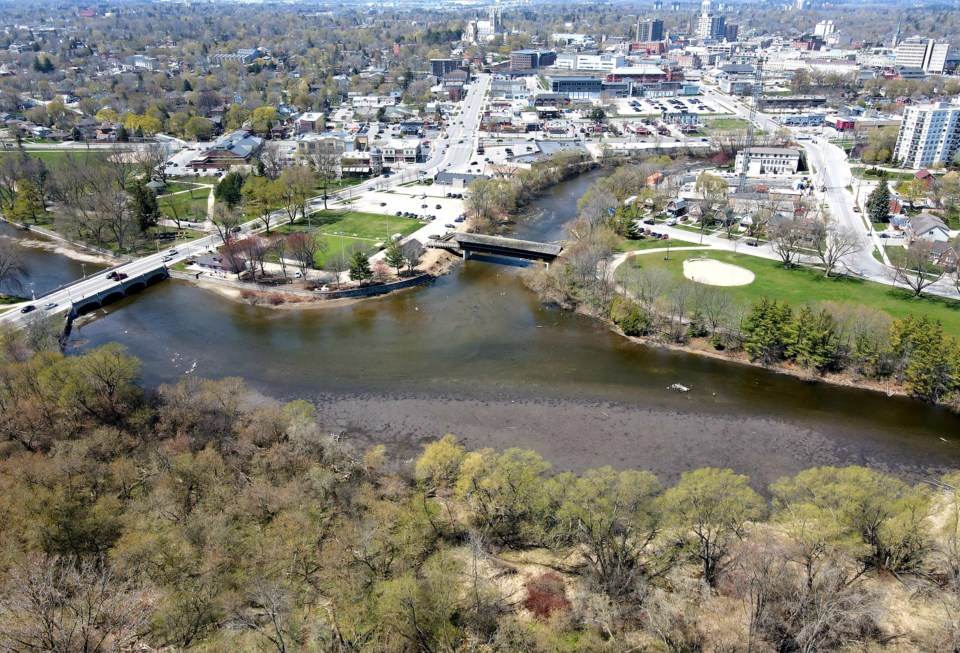I was downtown bright and early for the flag raising on the first day of Black History Month, and as a I looked around, I was struck by a single question: Where’s the dank?
Of course, there are still some corners downtown that have preserved the dank, but they’re getting fewer and far between. I stood in front of the Cornerstone, now under renovation, and remembered late evening coffee and cake with friends, chatting by what I’m almost definitely sure was candlelight, and no, this wasn’t during the big blackout in 2003.
There used to be a lived-in feel downtown, as in it used to feel like people lived there. It wasn’t always pretty, but it felt like it was ours, and it felt like someplace organic, interesting and unique to a place called Guelph.
But Guelph isn’t something for the people that live here anymore, is it?
This is a question that swirled in my mind this week coming out of Monday’s council meeting. Again, the 2022-2026 Economic Development and Tourism Strategic Plan was discussed, and some councillors wanted to talk about pet tourism projects. We can be a Bike City! We can be a Music City! Let’s usurp Cawker City, Kansas, by making the world’s biggest (arguable) ball of twine!
Look, I’m not saying that tourism isn’t important to our city’s economy, but this feels like another extension of Guelph’s apparent inferiority crisis: How Guelph looks from the outside is more important that how Guelph is on the inside.
More on that in a minute, but we have to first tackle the elephant in the room because no one at council this week asked where we’re going to put all these people attracted to Bike City Guelph, or whatever.
The old Best Western is long gone, the Parkview is being turned into supportive housing, the Holiday Inn on Scottsdale is about to become a student dorm and there are always rumours circling that other smaller hotels are looking to cash out on the land under their feet.
Soon, only the big hotels on the outskirts of town will be left, and nothing says “Welcome to Guelph” like staying just off the highway, nowhere near any of the amenities that are supposedly drawing you here in the first place. It’s curious why opening a hotel downtown, or near downtown, has never been a business priority.
So is this not putting the cart before the horse? Should we not figure out where to put all the visitors when they get here before deciding on a strategy to draw them in?
Perhaps the expectation is that businesses and entrepreneurs in Guelph will just figure it out, and I know exactly how they’ll do it.
Prepare for an explosion of more AirBnBs and other short-term rentals should tourism bounce back with the end of the pandemic, which will have inflationary effect on rent and housing prices, thus making living in Guelph even more unaffordable for those of us that are already here.
I’m sure some of you are thinking, “Come on, there’s no way that many people are coming to Guelph on a regular basis!” You would be wrong.
In pre-pandemic days, Guelph was a very popular destination, just not for any of the novel ideas shared around the council horseshoe. There are conferences at the University of Guelph, visiting workers and staff from other branches of multinationals based in Guelph, and then there are the tournaments. Hockey, ringette, swimming, dancing, lacrosse, curling and field hockey are always being played some weekend.
Strange how no one at council proposed “Sports City.” Strange with my life-long despise of jocks and jocularity that I would be the one to propose “Sports City," but I digress.
There’s also the fact that Guelph’s hotels have been used as a convergence place for other big area events, the twice annual Home Hardware convention in Elora and the Highland Games in Fergus being big examples. These events pack Guelph hotels, and although they’re not strictly Guelph events, are there not ancillary economic benefits from having them nearby?
It makes you wonder if the tourism strategy should have been a more regional one, but that would mean that Guelph is not a special oasis in a cultural desert, and it would puncture the perfect looking image Guelph has of itself. People want to come here, and only here. They don’t want to come around here.
It’s gone a little unnoticed this week, but the Ontario Land Tribunal is hearing the appeal of the city’s refusal to allow Skydev to build a 25-story tower on Fountain Street. Despite the number of new towers being approved in the south end on a regular basis, it’s still sacrosanct to build high density towers downtown with very few exceptions. Council and residents come down on those ideas like a tonne of bricks.
Why? We don’t want to ruin that postcard image of Downtown (capital ‘D’) Guelph, perfectly manicured now for those Instagramable moments because how something looks is more important than how it is, especially for outsiders.
Is it ever good enough for the City of Guelph that there are thousands of us who are already here? What have they done for us lately?
